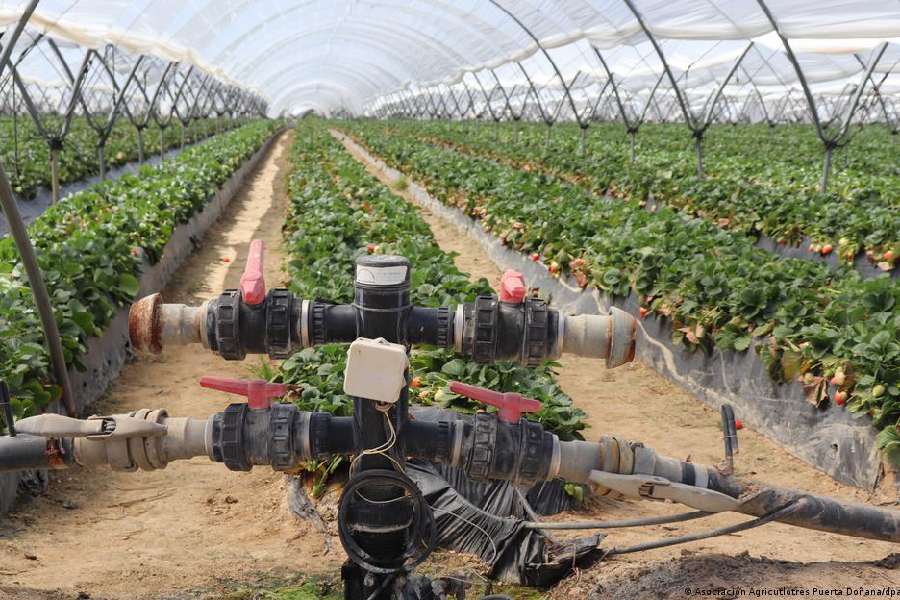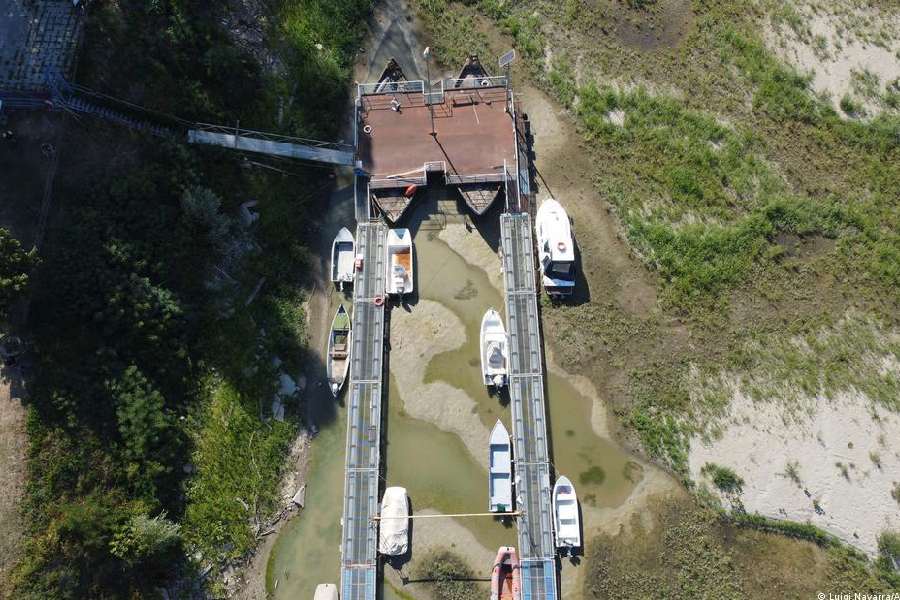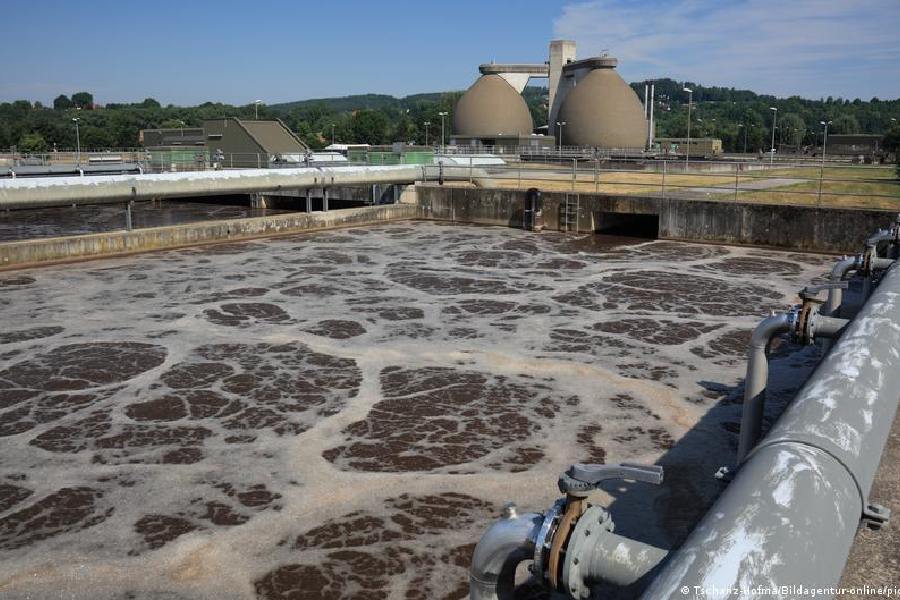In Europe, water shortages are causing tensions in some countries. But, for now, there's enough water to go around. Using the precious resource more efficiently is key.
Europe has experienced severe heat and drought over the last few summers, and 2023 has been no different. Vast swathes of Central and Southern Europe are simply too dry from a lack of rainfall.
Virtually all of the Czech Republic and Lithuania were in drought in July.
March saw protesters in France clash with police over the construction of water reservoirs meant to bring relief to drought-plagued farms. The green campaigners fear the basins could lead to sinking groundwater levels.
In Spain, water reserves have dropped to 41%, according to officials, with farmers experiencing severe crop losses and water restrictions in place in some regions.
Human-induced climate change has led to more heat waves and drought and is one reason for Europe's growing water crisis.
At the same time, demand for the resource is growing, with industry and agriculture extracting more water from the ground, rivers and lakes than can be replenished.
Who uses the most water?
Industry uses half of Europe's water resources, while a further 40% is hoovered up by agriculture and 10% by households, according to Marc Bierkens, a hydrologist at Utrecht University in the Netherlands.
In the European Union, water scarcity impacts 11% of all citizens. Falling water supplies can lead to households facing use restrictions. But the problem also impacts the energy sector.
In 2022, French authorities had to switch off some nuclear power plants because river water used for cooling them was too warm. Last year, the dry summer also reduced hydropower in Norway.
Farmers, though, who use large amounts of water for crop irrigation are also hard hit by water shortages and drought.
Could using industry wastewater help farmers?
One solution for agriculture could be to use more treated industrial and domestic wastewater for irrigation and protect valuable freshwater supplies. Six times more waste water could be reused across the EU than current levels.
"Freshwater resources are scarce and increasingly under pressure. In times of unprecedented temperature peaks, we need to stop wasting water and use this resource more efficiently," Virginijus Sinkevicius, EU Commissioner for the Environment, Oceans and Fisheries, wrote in a press release.
New EU regulations on minimum requirements for water reuse for agricultural irrigation came into force this summer. The regulations stipulate that EU member states must process communal and industrial wastewater so it can be used by farmers.
Processing and reusing water could replace a fifth of irrigation that currently uses groundwater in Spain and Portugal, said the European Commission. In France, Italy and Greece, it could be as much as 45%. Wastewater could cover all irrigation needs in EU countries with smaller agricultural sectors.
Good processing plants for industry important for water quality
"It's all about water quality," said hydrologist Marc Bierkens.
Today, large industrial facilities already have their own processing plants, which often release water into rivers.
"Depending on the industry, the water is often even better than processed household wastewater," added Bierkens.
But this is not the case for all sectors.
Using industrial and communal wastewater for irrigation can be risky if water processing plants don't manage to filter out all pollutants. These pollutants could contaminate soil and plants.
Germany's federal environment agency, the UBA, has been critical of the EU's new wastewater regulations, saying it doesn't include certain substances. Another concern is that water levels in rivers could drop further if too little processed water from industry and municipalities is fed back into them.
Cost is another factor in whether more recycled water will be used in agriculture or not. If transportation from processing plant to field is too far, it's not worth it for farmers. And that's often the case in countries like Slovenia, Bulgaria and Poland.

Critics also say that while the EU is promoting sustainable water use on one hand, its common agriculture policy (CAP) grants for irrigation may effectively be "incentivizing water overuse" by farmers on the other.
Switching from rice to maize, millet and wheat cultivation in Southern Europe?
Efforts to optimize irrigation in agriculture already exist, according to Bierkens. Using efficient drip irrigation is better than large-scale water sprinklers, for instance. But the biggest water saving potential lies in growing crops that are less thirsty, said Bierkens.
Italy is home to Europe's largest rice-growing area. Rice cultivation uses a lot of water. Farmers around the Po River, which is at the center of Italian rice cultivation, have suffered severe crop losses for the second year in a row due to a lack of winter snowfall in the Alps and low water levels.

The Po river has seen water levels drop dramatically Luigi Navarra/AP/picture alliance
Bierkens thinks Italian farmers could benefit from growing maize or wheat instead.
"Winter wheat is a crop plant that is less water dependent. It also grows early and already ripens in early summer. So you don't need a lot of water," said the hydrologist, who added that this would also mean a change in diet.
German farmers also faced crop losses in summer 2022, with some switching to plants that can withstand heat and don't need too much water, such as legumes like lentils and chickpeas.
Leaky pipes lead to massive water waste
One way to save water that is often overlooked is maintaining the pipes that shuttle the resource to homes and businesses. On average, a quarter of the EU's freshwater is lost during transport to taps because of leaks and broken pipes.
Bulgaria is the EU's worst offender. Some 60% of its water disappears through leaks. In Italy, a drought hot spot, roughly 40% is lost. In Portugal, the share lies at around 30%.
Currently, countries most affected by drought and a lack of rain — such as Spain, Italy and Bulgaria — invest the least amount of money per citizen to fix leaky water infrastructure.
This article originally appeared in German.











